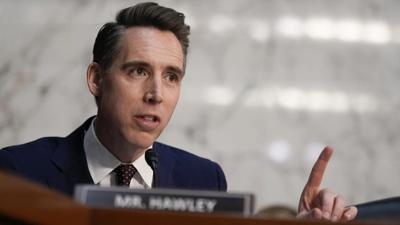
Sen. Josh Hawley, R-Mo., speaks during a confirmation hearing on Jan. 15 at the Capitol in Washington.
U.S. Sen. Josh Hawley on July 1 voted in favor of a tax and spending bill that tightened Medicaid work requirements and signaled future funding cuts for rural hospitals.
After weeks of saying he wanted to protect Medicaid, his vote in favor of the bill was met with harsh criticism from Democrats.
In response, Hawley maintained his position of being pro-Medicaid, except for more strictly enforcing work requirements.
“I think cutting Medicaid benefits is insane ... and I have not changed my view on that at all,” Hawley said in a recent interview with the Post-Dispatch.
So on Tuesday, Hawley introduced a bill that aims to make good on the promises he made to fight the Medicaid reductions he ultimately supported by voting in favor of the spending bill.
Hawley's stated main objection to the Medicaid section of the spending bill was in the area of funding for rural hospitals, specifically through a “provider-fee” tax that helps smaller health centers provide services.
People are also reading…
In the Medicaid bill Hawley introduced this week, two major components address the issues that Hawley said he does not like in the recently passed spending bill:
• Repeal the reduction in provider-tax fees that are scheduled to begin in Missouri in 2030. Hawley and other senators negotiated the four-year delay with more hard-line Republicans, who wanted the fee reductions to take effect immediately.
“Any changes to the provider-tax framework have been pushed out to 2030, and I don't ever want them to take effect,” Hawley said.
• Increase the money in a fund to financially assist rural hospitals to $100 billion. In last week's negotiations, the fund was established in the amount of $50 billion, to be spent through 2029. His new legislation would allocate another $50 billion for years 2030 through 2035.
In its current funding form, $50 billion, Hawley said Missouri will be eligible for $250 million a year in additional funding for rural hospitals.
“In the next four years, Missouri will get $1 billion extra dollars for our rural hospitals,” Hawley said.
Hawley defended his vote in favor of the spending bill, generally embracing the theory of not letting perfect be the enemy of good.
“As part of a mega-bill, sometimes there's stuff in there you like and sometimes there's stuff in there you don't like,” Hawley said, then cited some specifics.
He then pointed out to other items in the spending bill he thought were important enough to support with his affirmative vote.
“We could not wait, in my view, to do the blue-collar tax cuts — no taxes on overtime, no taxes on tips,” he said.
“And frankly,” he said, “we couldn't wait to raise the debt ceiling.”
But most important, Hawley said, was the expansion of the Radiation Exposure Compensation Act.
RECA stands to provide compensation to numerous residents of north ӣ����Ƶ County and St. Charles County who were exposed to uranium waste that was a byproduct of nuclear weapons production during World War II and the Cold War.
“Here's the deal: I believe that RECA could not wait any longer,” Hawley said, describing the act's provisions as “our chance to expand health care coverage for tens of thousands of Missourians ... and maybe millions around the country.”
Celebrate ӣ����Ƶ hosted a Superman-themed drone show before the Fourth of July fireworks on Friday, July 4, 2025. Video by Eli Randolph, ӣ����Ƶ














